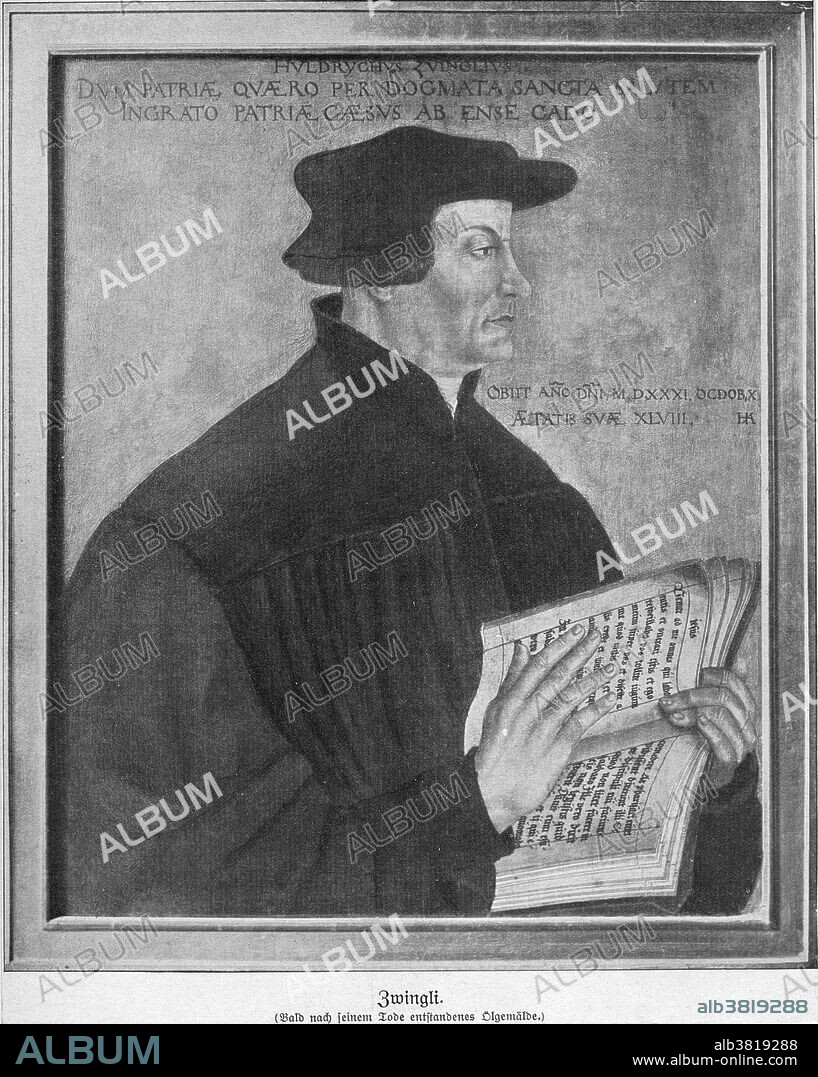alb3819288
Huldrych Zwingli, Swiss Reformation Leader

|
Zu einem anderen Lightbox hinzufügen |
|
Zu einem anderen Lightbox hinzufügen |



Haben Sie bereits ein Konto? Anmelden
Sie haben kein Konto? Registrieren
Dieses Bild kaufen.
Nutzung auswählen:

Titel:
Huldrych Zwingli, Swiss Reformation Leader
Untertitel:
Siehe automatische Übersetzung
Huldrych Zwingli (January 1, 1484 - October 11, 1531) was a leader of the Reformation in Switzerland. Born during a time of emerging Swiss patriotism and increasing criticism of the Swiss mercenary system, he attended the University of Vienna and the University of Basel, a scholarly center of Renaissance humanism. In 1518 he began to preach ideas on reforming the Catholic Church. In 1522, he attacked the custom of fasting during Lent. In his publications, he noted corruption in the ecclesiastical hierarchy, promoted clerical marriage, and attacked the use of images in places of worship. In 1525, he introduced a new communion liturgy to replace the Mass. The Reformation spread to other parts of the Swiss Confederation, but several cantons resisted, preferring to remain Catholic. Zwingli formed an alliance of Reformed cantons which divided the Confederation along religious lines. In 1529, a war between the two sides was averted at the last moment. His ideas came to the attention of Martin Luther and other reformers. They met at the Marburg Colloquy and although they agreed on many points of doctrine, they could not reach an accord on the doctrine of the Real Presence of Christ in the Eucharist. In 1531 his alliance applied an unsuccessful food blockade on the Catholic cantons. The cantons responded with an attack and Zwingli was killed in battle at the age of 47. His legacy lives on in the confessions, liturgy, and church orders of the Reformed churches of today.
Bildnachweis:
Album / Science Source / Photo Researchers, Inc.
Freigaben (Releases):
Model: Nein - Eigentum: Nein
Rechtefragen?
Rechtefragen?
Bildgröße:
2550 x 3192 px | 23.3 MB
Druckgröße:
21.6 x 27.0 cm | 8.5 x 10.6 in (300 dpi)
Schlüsselwörter:
16. JAHRHUNDERT • 16. JH. • BERÜHMT • BERÜHMTE PERSÖNLICHKEIT • EUROPAEER (F M) • EUROPAEER • EUROPÄER (F M) • EUROPÄER • EUROPÄISCH • ILLUSTRATION • ILLUSTRATIONS • MANN • NOTABEL • PERSON • PERSöNLICHKEITEN • PERSÖNLICHKEITEN • PORTRAIT • PROMINENZ • REFORMIERTE KIRCHE • RELIGION
 Pinterest
Pinterest Twitter
Twitter Facebook
Facebook Link kopieren
Link kopieren Email
Email
